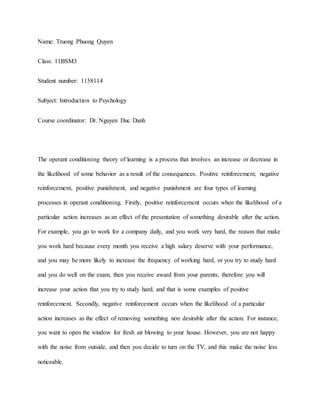Recommended
More Related Content
What's hot
What's hot (20)
Students’ perspective on behaviour management in the classroom

Students’ perspective on behaviour management in the classroom
Self-regulation Strategies for School-age Children

Self-regulation Strategies for School-age Children
how to grow your teacher in student learning spirit.

how to grow your teacher in student learning spirit.
Proactive strategies to change student misbehavior

Proactive strategies to change student misbehavior
Similar to Psycho
Similar to Psycho (20)
Promoting student achievement through positive reinforcement

Promoting student achievement through positive reinforcement
I have an a reflection assignment on professional issue, what Ive.docx

I have an a reflection assignment on professional issue, what Ive.docx
More from Quyen Truong
More from Quyen Truong (20)
Power Point Presentation - Communication Culture of Chinese

Power Point Presentation - Communication Culture of Chinese
Psycho
- 1. Name: Truong Phuong Quyen Class: 11BSM3 Student number: 1158114 Subject: Introduction to Psychology Course coordinator: Dr. Nguyen Duc Danh The operant conditioning theory of learning is a process that involves an increase or decrease in the likelihood of some behavior as a result of the consequences. Positive reinforcement, negative reinforcement, positive punishment, and negative punishment are four types of learning processes in operant conditioning. Firstly, positive reinforcement occurs when the likelihood of a particular action increases as an effect of the presentation of something desirable after the action. For example, you go to work for a company daily, and you work very hard, the reason that make you work hard because every month you receive a high salary deserve with your performance, and you may be more likely to increase the frequency of working hard, or you try to study hard and you do well on the exam, then you receive award from your parents, therefore you will increase your action that you try to study hard, and that is some examples of positive reinforcement. Secondly, negative reinforcement occurs when the likelihood of a particular action increases as the effect of removing something non desirable after the action. For instance, you want to open the window for fresh air blowing to your house. However, you are not happy with the noise from outside, and then you decide to turn on the TV, and this make the noise less noticeable.
